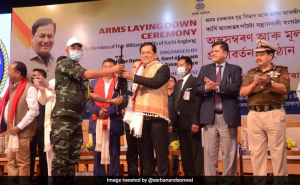Surrender of more than 1000 Karbi Militants in Assam

![]()
News Desk
On 23 February evening, 1,040 militants of five militant groups of Karbi Anglong district ceremonially laid down arms at an event in Guwahati in the presence of Chief Minister Sarbananda Sonowal. Among the surrendered militants Ingti Kathar Songbijit, a primary accused in multiple cases of militancy and ethnic violence in the state is also available.

Insurgency by Karbi, a major ethnic community, dotted by several factions and splinters had a long history in Assam, marked by killings, ethnic violence, abductions and taxation since the late 1980s. The surrendered militants comprised cadres from five outfits- Karbi People’s Liberation Tiger (KPLT), People’s Democratic Council of Karbi Longri (PDCK), Karbi Longri NC Hills Liberation Front (KLNLF), Kuki Liberation Front (KLF) and United People’s Liberation Army (UPLA). More than 300 weapons and 11,203 bullets were handed over by the militants during the surrender.
These outfits originated from a core demand of forming a separate state; the Karbi Anglong Autonomous Council (KAAC) is an autonomous district council, protected under the Sixth Schedule of the Indian Constitution. The Karbi National Volunteers (KNV) and Karbi People’s Force (KPF) came together to form the United People’s Democratic Solidarity (UPDS) in late 1990s. In November 2011, UPDS gave up arms and signed a tripartite memorandum of settlement with the Centre and the government of Assam, settling for enhanced autonomy and special packages for the KAAC. The then general secretary of the UPDS, Horen Sing Bey, is now the BJP MP from the Autonomous District Lok Sabha constituency.

The entire political discourse in this constituency comprising three districts of Karbi Anglong, West Karbi Anglong and Dima Hasao revolves around the demand for granting of “Autonomous State” status to the region and more autonomy and power to the KAAC and the North Cachar Hills Autonomous Council (which administers over Dima Hasao district).
GP Singh, ADGP (Law and Order) of Assam has said, “It’s a very significant development, not only for Karbi Anglong or Assam but also for Nagaland. It means that all insurgent outfits of Karbi Anglong district have now been brought into the mainstream.”
Singh added, “Karbi Anglong is a very important district in the state, and the largest in terms of area. Karbi Anglong militant outfits joining the mainstream means a decline in influence of Naga militant outfits in Assam. With this surrender a huge number of weapons have come over ground and that is a major step towards peace in the state.”
CM Sonowal congratulated the surrendered militants for coming back to mainstream society and urged them to contribute in the journey of state’s progress. “The government’s role is not limited to only bringing back the militants but also it is committed to ensure a life of dignity and respect for those who have surrendered arms by facilitating opportunities for livelihood and employment,” he added.
The developments have been achieved a year after a peace and development agreement was signed with multiple Bodo militant outfits, bringing an end to a violent movement for a separate Bodoland. Songbijit is the self-styled chief of the outfit PDCK. His surrender is significant because he is a primary accused in multiple cases of militancy and ethnic violence. He has been a ‘most-wanted’ militant in Assam.
Interestingly, Songbijit is a Karbi by birth and ethnicity but had long been related to Bodo insurgency. In 2012, he broke away from one faction of the National Democratic Front of Bodoland (NDFB) the NDFB(RD) and formed his own faction, NDFB(S). The faction is alleged to be responsible for the massacre of 70 people in Assam in December 2014. In 2015, Songbijit was removed as the chief of the group and B Saoraigwra took over. Then, Songbijit went on to form his Karbi outfit.
A senior Assam police officer has said on the condition of anonymity, “Songbijit has been charge-sheeted by the NIA. So now it needs to be seen as to what decision will be taken on him by the NIA, the government of India and the government of Assam.” The officer added, “Arms have been laid down. Now an agreement needs to be reached regarding the terms and conditions for the road ahead.”